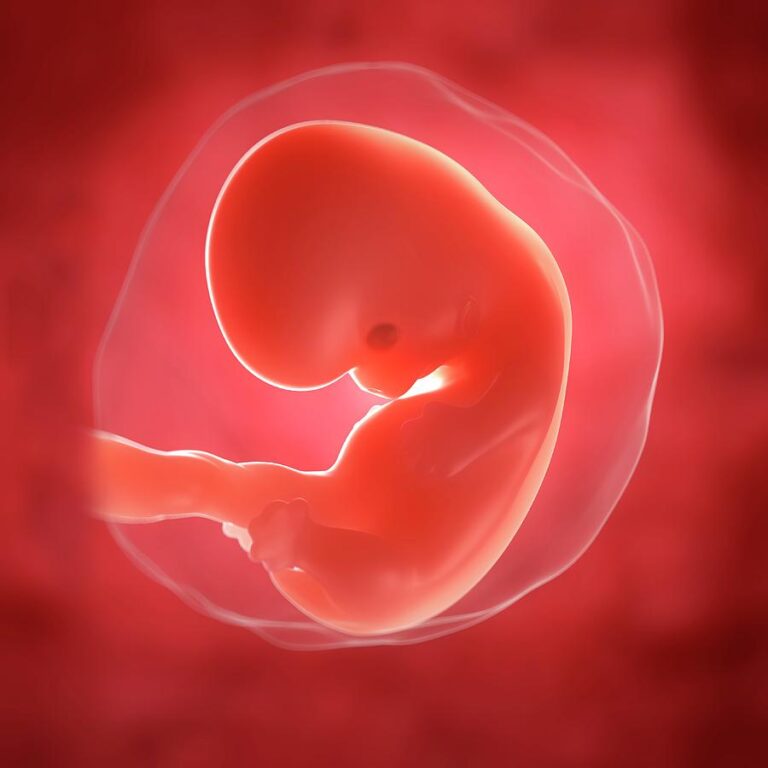7 weeks pregnant: Pregnancy Symptoms & Baby Development
Read time: 4 minutes
7 weeks pregnant is how many months?
Month 2 (Trimester 1)
Baby development at 7 weeks
Your baby’s arm buds are emerging and flat, paddle-like hands are forming.
Iodine
Discover why you might want to consider taking a daily Iodine supplement.
Eat well
Feed your baby's future with a healthy, balanced pregnancy diet.
Baby development at 7 weeks

What does my baby look like? And, what size is my baby?
At 7 weeks pregnant, your baby measures anywhere between 4mm1 and 10mm2 long and is roughly the size of a blueberry. They are developing a more baby-like appearance3, with arms buds becoming longer, and flat, paddle-like hands emerging.
At this stage, your baby’s head is growing faster than their body; a reflection of the rapid and intense brain growth that’s happening. Their heart is also developing, and has divided into distinct right and left chambers. At the same time, air passages are starting to form within the lungs – these will eventually grow into a more complex network of bronchi.
If you were able to see your baby’s face, you’d be able to spot two tiny nostrils. Their mouth is taking shape too, with lips, a tongue and tooth buds appearing1. Meanwhile, their eyes and inner ear structures continue to develop, although it will be some time before these function properly.
Pregnancy at 7 weeks (first trimester)
What’s happening in my body?
While it’s common to feel a little bloated at 7 weeks pregnant, it’s unlikely that you’ll look pregnant, or see any signs of a bump yet.
Early pregnancy symptoms at 7 weeks

Early pregnancy symptoms vary from person to person. At 7 weeks, you may experience any of the following signs of pregnancy, or no symptoms at all:
Breast tenderness
Your breasts may become larger and feel sore. You may also find your nipples stick out more than usual and darken in colour as your body begins to prepare for breastfeeding.
Tiredness and fatigue
During the first 12 weeks, hormonal changes can leave you feeling tired or exhausted.
Nausea and vomiting
Morning sickness affects up to 80% of mums-to-be in the first trimester6. It can strike at any time of the day or night and varies from mild nausea to sickness throughout the day.
Bloating and gas
The pregnancy hormone progesterone slows down your digestion which can lead to bloating and excess gas.
Cramping or bleeding
Light cramping and spotting are common in the early stages of pregnancy8,9. If the pain becomes severe (stronger than period cramps) or if bleeding becomes heavy, you should talk to your GP.
Frequent urination
Frequent trips to the bathroom are one of the most common symptoms of early pregnancy, as your growing uterus begins to put pressure on your bladder.
Mood swings
Pregnancy hormones, oestrogen and progesterone, soar during the first 12 weeks of pregnancy10, affecting how you’re feeling emotionally. Get plenty of rest and light exercise to keep you feeling like yourself.
Focus on iodine
Iodine is a trace mineral found in foods like fish, milk and cheese and is important for healthy brain development10. Despite being present in many foods, a scientific study found that iodine deficiency is a public health concern11. If you’re not sure you’re getting sufficient levels of iodine, talk to your GP or midwife about taking an iodine supplement.
If you’re not sure you’re getting sufficient levels of iodine, talk to your GP or midwife about taking an idodine supplement.

Replacing your regular salt with an iodised version is a great way to increase your iodine intake. You can also boost your iodine levels by including the following foods in your diet.
- Haddock
- Cod
- Prawns and other pregnancy safe seafood (make sure they are cooked)
- Milk
- Yogurt
- Seaweed
THE
SCIENCE
BEHIND
IODINE:
Powered by Nutricia
Iodine helps make the hormones produced by the thyroid gland14. These hormones assist in regulating your metabolism and keeping cells healthy15. Iodine has also been shown to contribute to normal cognitive function14. Scientific studies have led experts to believe that iodine may be more important in pregnancy than was previously thought.
The current recommended daily intake (RNI) of iodine for women between the ages of 19 and 50 is 0.14mg16. Maintaining an adequate intake during pregnancy will support normal growth in your baby, as well as helping to regulate your own thyroid hormones.
